From Apple To Avon: Six Inspiring Marketing successes
In the ever-evolving world of business, where competition is fierce and consumer preferences are constantly shifting, the art of effective marketing stands as a beacon of inspiration. From the iconic allure of Apple’s sleek devices to the empowering message of Avon’s direct-selling model, and from the timeless appeal of Coca-Cola to the energetic spirit of Nike, the stories of these marketing successes are as diverse as the products they represent. In this article, we embark on a journey through the realms of marketing brilliance, uncovering the strategies and tales that propelled these brands to greatness. Join us as we explore the captivating stories of Apple to Avon, six inspiring marketing successes that have left an indelible mark on the world of business.
Apple:
 Apple Inc. stands as a quintessential example of how innovative marketing campaigns, groundbreaking product launches, and unwavering brand loyalty can transform a company into a global tech giant. Central to Apple’s success is its ability to think differently. The “Think Different” campaign, launched in the late 1990s, not only celebrated creative icons but also conveyed Apple’s commitment to pushing the boundaries of technology. This campaign struck a chord with consumers, positioning Apple as a brand that valued individuality and innovation.
Apple Inc. stands as a quintessential example of how innovative marketing campaigns, groundbreaking product launches, and unwavering brand loyalty can transform a company into a global tech giant. Central to Apple’s success is its ability to think differently. The “Think Different” campaign, launched in the late 1990s, not only celebrated creative icons but also conveyed Apple’s commitment to pushing the boundaries of technology. This campaign struck a chord with consumers, positioning Apple as a brand that valued individuality and innovation.
Perhaps the most significant turning point in Apple’s history was the launch of the iPhone in 2007. Apple’s marketing strategy for the iPhone was nothing short of genius. Steve Jobs, the company’s co-founder, was a masterful presenter who could turn a product launch into a global event. The iPhone was marketed as a revolutionary device that could do it all—phone, music player, and internet browser. This marketing brilliance, coupled with the product’s actual performance, created a fervor that propelled Apple to new heights.
Apple’s brand loyalty is a testament to its customer-centric approach, ensuring that its products not only meet but exceed customer expectations. The seamless integration of hardware, software, and services, coupled with exceptional design, has fostered a loyal customer base that eagerly anticipates each new Apple release. In essence, Apple’s journey from a garage start-up to a global tech giant is a remarkable story of how innovation, marketing, and unwavering brand loyalty can shape the destiny of a company.
Avon:
Avon, a cosmetics and personal care company, has achieved remarkable success by leveraging a direct-selling model and empowering marketing initiatives. At the core of Avon’s strategy is its commitment to empowering independent sales representatives, who are predominantly women. This approach not only enhances the financial independence of these representatives but also drives Avon’s sales growth. Avon’s direct-selling model fosters a personal connection between representatives and customers. Representatives act as brand ambassadors, offering personalized product recommendations and building trust with their clients. Avon’s marketing initiatives focus on empowering these representatives with the tools, training, and support they need to succeed. By providing a platform for women to run their businesses independently, Avon has created a network of motivated sellers.
Avon’s marketing campaigns often center around themes of empowerment, beauty, and self-confidence. These campaigns resonate with consumers, particularly women, who see Avon as a brand that understands their needs and aspirations. Avon’s commitment to social causes, such as breast cancer awareness, further strengthens its connection with its target audience. Avon’s remarkable sales growth is a testament to its direct-selling model, commitment to empowering women, and marketing initiatives that resonate with its target demographic. It showcases how a company can build a loyal customer base and a motivated salesforce by aligning its values with the aspirations of its customers and representatives.
Coca-Cola:
Coca-Cola’s long-lasting success and iconic brand are the result of creative marketing campaigns, memorable ads, strategic sponsorships, and brand partnerships. Since its inception in the late 19th century, Coca-Cola has remained at the forefront of the global beverage industry. One of the key factors behind Coca-Cola’s success is its ability to create an emotional connection with consumers. The brand has consistently delivered memorable advertising campaigns that evoke feelings of happiness, nostalgia, and togetherness. Iconic slogans like “Open Happiness” and “Share a Coke” have reinforced the idea that Coca-Cola is more than just a beverage; it’s a source of joy and unity.
Coca-Cola’s marketing efforts have extended beyond traditional advertising. The company has been a pioneer in sponsorships, associating its brand with major sporting events like the FIFA World Cup and the Olympics. These sponsorships not only provide global exposure but also align Coca-Cola with the spirit of celebration and competition. Coca-Cola’s strategic brand partnerships, such as those with Disney and McDonald’s, have allowed the brand to extend its reach and tap into diverse customer segments. By integrating its products into popular culture and entertainment, Coca-Cola maintains its status as a beloved and recognized brand worldwide.
Nike:

Nike’s dominance in the athletic apparel and footwear industry is the result of a multi-faceted marketing strategy that encompasses athlete endorsements, compelling storytelling through “Just Do It” campaigns, and active engagement with social and cultural movements. Nike’s athlete endorsements have been a cornerstone of its marketing success. By partnering with some of the world’s most iconic athletes, such as Michael Jordan, LeBron James, and Serena Williams, Nike not only gains access to their immense fan bases but also aligns its brand with the values of excellence, determination, and athleticism. These partnerships inspire consumers to aspire to greatness through sports and fitness.
The “Just Do It” campaign, introduced in 1988, has become synonymous with Nike’s brand identity. This powerful slogan and accompanying advertisements encourage individuals to overcome obstacles and pursue their goals, whether in sports or life. It transcends mere product promotion to evoke powerful emotions and connect with consumers on a personal level. Nike’s active engagement with social and cultural movements has kept the brand relevant and resonant with today’s consumers. Nike’s support for causes like racial equality and social justice, as seen in its collaboration with Colin Kaepernick, has sparked conversations and garnered widespread attention. This not only aligns the brand with important societal issues but also connects with consumers who value corporate responsibility and social change.
Tesla:
 Tesla, the disruptor in the automotive industry, has achieved remarkable success through a combination of innovative technology, word-of-mouth marketing, and the charismatic leadership of Elon Musk. This unique blend has allowed Tesla to create a cult-like following and transform perceptions about electric vehicles (EVs). Tesla’s innovative technology is at the core of its marketing strategy. The company has consistently pushed the boundaries of what is possible with EVs, offering high-performance electric cars with cutting-edge features like Autopilot and Ludicrous Mode. Tesla’s electric vehicles are not just environmentally friendly; they are also sleek, powerful, and technologically advanced, appealing to a wide range of consumers.
Tesla, the disruptor in the automotive industry, has achieved remarkable success through a combination of innovative technology, word-of-mouth marketing, and the charismatic leadership of Elon Musk. This unique blend has allowed Tesla to create a cult-like following and transform perceptions about electric vehicles (EVs). Tesla’s innovative technology is at the core of its marketing strategy. The company has consistently pushed the boundaries of what is possible with EVs, offering high-performance electric cars with cutting-edge features like Autopilot and Ludicrous Mode. Tesla’s electric vehicles are not just environmentally friendly; they are also sleek, powerful, and technologically advanced, appealing to a wide range of consumers.
Word-of-mouth marketing has played a pivotal role in Tesla’s success. Satisfied Tesla owners often become enthusiastic advocates, sharing their positive experiences with family, friends, and on social media. This organic, grassroots promotion has generated significant buzz and helped Tesla expand its customer base without traditional advertising. Elon Musk’s charismatic leadership and his active presence on social media platforms have added to Tesla’s allure. Musk’s vision, ambition, and passion for sustainable energy and space exploration resonate with Tesla’s mission, and his tweets and public statements often generate headlines and interest in the company.
Starbucks:
 Starbucks’ journey from a small Seattle coffee shop to a global coffeehouse chain is a testament to its emphasis on customer experience, store design, and community engagement as key elements in its marketing success. Central to Starbucks’ strategy is its unwavering commitment to providing an exceptional customer experience. Starbucks stores are designed to be inviting and comfortable, creating a “third place” for customers beyond home and work. The friendly baristas, customized drinks, and welcoming atmosphere encourage customers to linger, socialize, and enjoy their coffee, fostering loyalty and repeat visits. Store design plays a pivotal role in Starbucks’ branding.
Starbucks’ journey from a small Seattle coffee shop to a global coffeehouse chain is a testament to its emphasis on customer experience, store design, and community engagement as key elements in its marketing success. Central to Starbucks’ strategy is its unwavering commitment to providing an exceptional customer experience. Starbucks stores are designed to be inviting and comfortable, creating a “third place” for customers beyond home and work. The friendly baristas, customized drinks, and welcoming atmosphere encourage customers to linger, socialize, and enjoy their coffee, fostering loyalty and repeat visits. Store design plays a pivotal role in Starbucks’ branding.
The familiar green and white logo, cozy seating arrangements, and consistent aesthetics create a sense of familiarity and brand recognition across the globe. Starbucks stores are designed to reflect the local culture, adding a touch of personalization to each location. Community engagement is another cornerstone of Starbucks’ marketing success. Initiatives like the Starbucks Foundation, Ethos Water, and partnerships with organizations like RED demonstrate the company’s commitment to social responsibility. These efforts resonate with socially-conscious consumers and enhance Starbucks’ reputation as a socially responsible brand.
Final Thoughts
In the world of marketing, where innovation and adaptability reign supreme, the success stories of Apple to Avon serve as powerful testaments to the art and science of captivating an audience. As we close this chapter on these six inspiring marketing successes, one thing becomes abundantly clear: there is no one-size-fits-all approach to achieving greatness in the realm of branding and promotion. Each of these companies carved its unique path, leveraging creativity, customer-centricity, and sometimes sheer audacity to capture the hearts and minds of consumers worldwide. The lessons learned from Apple’s innovation, Avon’s empowerment, Coca-Cola’s timeless appeal, Nike’s determination, Tesla’s disruption, and Starbucks’ community-building are invaluable. They remind us that in the dynamic landscape of marketing, where change is the only constant, the power to inspire and connect with customers remains the truest measure of success.
Dive deep into insights, tips, and the latest trends delivered straight to your inbox. Unlock exclusive content, be the first to know about our exciting updates, and join a community that thrives on innovation and growth.
Sign up for our newsletter now and never miss a beat in the dynamic world of business!
Subscribe Here:
We value your time and inbox space. Expect only the best from us, no spam included!


